It looks like you're using an Ad Blocker.
Please white-list or disable AboveTopSecret.com in your ad-blocking tool.
Thank you.
Some features of ATS will be disabled while you continue to use an ad-blocker.
share:
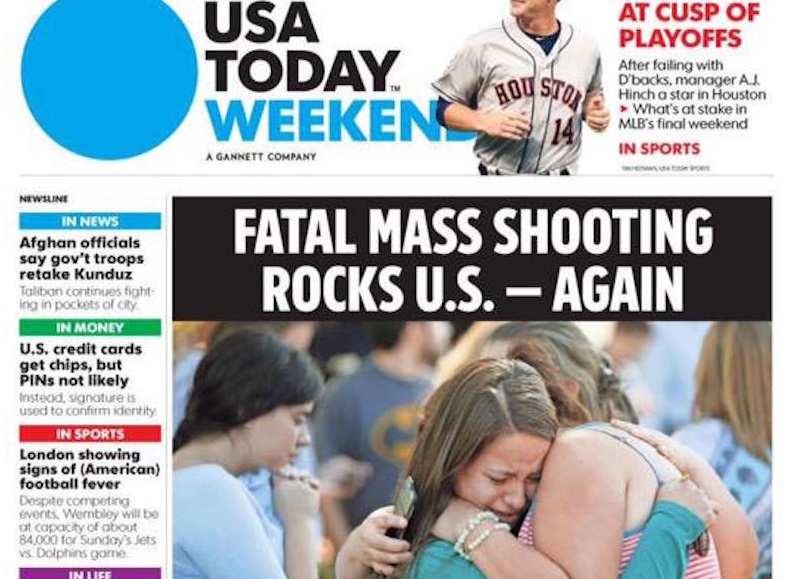
I CANT BELIEVE IT! THE HORROR! THE HUMANITY! MY POOR HEART STRINGS ARE SO TORN MY HAIR IS ON FIRE! THERE ARE JUST TOOOOO MANY SHOOTING RAWR!
Newsflash: What Can Go Wrong Will Go Wrong When There's Nearly 7,000,000,000 People On Earth!
Considering the extra large radar screen this site has for these kinds of stories (that happen 'anywhere' on Earth), for most days, quite frankly...
I think the big shocker is how few "big" shootings there actually are, and how few people actually get hurt, day to day.
It's important to understand here that the human brain just can't truly comprehend large numbers, which is important to comprehend when trying to comprehend the gravity of the "news" we're bombarded with.
"Our cognitive systems are very much tied to our perceptions," said Daniel Ansari, a researcher at the Numerical Cognition Laboratory at Western University in Canada. "The main obstacle is that we're dealing with numbers that are too large for us to have experienced perceptually." By contrast, we constantly experience small numbers. "Smaller numbers are more frequent in our daily vocabulary," Ansari said. "When you lay the table you ask your child, how many knives do we need? It's never going to be 10,000 unless you have a very big dinner party."
braindecoder.com...
Just here in the US we have nearly 320,000,000 people.
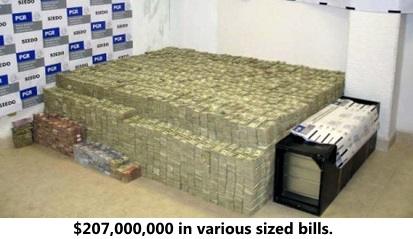
So when we see one "big" story any given week, and they play it on every network round the clock (for days sometimes), we're getting a grossly over-exaggerated representation of the actual scope of the problem concept.
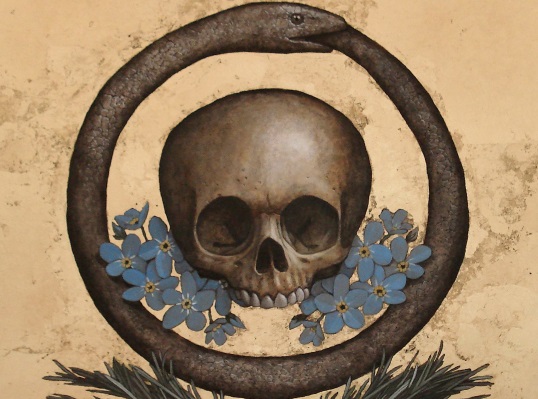
The film Natural Born Killers wasn't just about some sicko mass murdering 'kids'. The basis for Quentin Tarantino's original script was all about ostracizing the news media's roles in making celebrities out of murders (thus creating and maintaining a positive-feedback-loop to usher yet more murders).
As long as the news media keeps sensationalizing the shootings, and the stories keep getting HUGE ratings, the killings will only continue AND grow in terms of bodycounts & intensity & stagecraft.
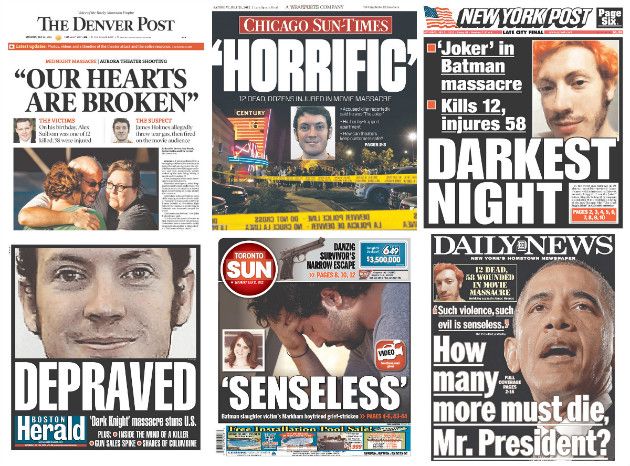
This is all a major component in what is known as the "Politics of Fear", which is old news in certain academic circles. Take here some compressed excerpts from David Althiede's 2003 paper, "Notes Towards A Politics of Fear":
I wish to chart the conceptual terrain of crime, terrorism, and victim by examining the connection between the mass media and the politics of fear, or decision-makers’ promotion and use of audience beliefs and assumptions about danger, risk and fear in order to achieve certain goals.
I suggest that the politics of fear is a dominant motif for news and popular culture. Moreover, within this framework, news reporting about crime and terrorism are linked with “victimization” narratives.
Fear is presented in the mass media, especially the news media as a feature of entertainment.
Audiences play with the repetitive reports as dramatic enactments of "fear and dread in our lives". The major impact of the discourse of fear is to promote a sense of disorder and a belief that ‘things are out of control.’
Ferraro suggests that fear reproduces itself, or becomes a self-fulfilling prophecy (Ferraro, 1995). Social life can become more hostile when social actors define their situations as "fearful" and engage in speech communities through the discourse of fear. What are very rare events are assumed to be common occurrences. For example, audience members not only talk about brutal assaults and even child kidnappings—which are very rare—but they begin to enact them as hoaxes and to “play with fear” in order to get attention. And people come to share an identity as competent "fear realists" as family members, friends, neighbours and colleagues socially construct their effective environments with fear. Behaviour becomes constrained, community activism may focus more on "block watch" programmes and quasi-vigilantism, and we continue to avoid "downtowns," and many parts of our social world because of "what everyone knows."
[I couldn't get the PDF link to work, but you can easily google up the full PDF file]
What he's getting at is the bombardment of this stuff against the masses is the deliberate agenda.
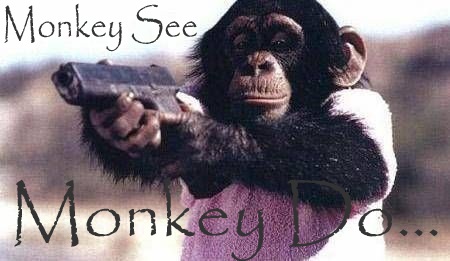
While the bigger picture is they are causing more shootings! For any doubters, dig this:
A copycat crime is a criminal act that is modeled or inspired by a previous crime that has been reported in the media or described in fiction.
The copycat effect is the tendency of sensational publicity about violent murders or suicides to result in more of the same through imitation.
The term was first coined around 1916 due to the crimes that were inspired by Jack the Ripper. Due to the increase of replicated crimes, criminologists soon began to realize that media coverage played a role in inspiring other criminals to commit crimes in a similar fashion.
en.wikipedia.org...
.
edit on 28-6-2016 by IgnoranceIsntBlisss because: (no reason given)
More from David Althiede:
The point is, when they blast the news of a single shooting event repeatedly all day long to 300+ million people, this is what we call gross over-reporting. The obvious effect is to create the perception of there being "too many" shootings. Quite frankly, with so many people in this culture of militaristic violence, I'm surprised we don't hear crazy stories all the time involving crazy explosions and so on, just a a mere inherent part of life with so many people running around with all manner of various mental illnesses and such.
I liken this effect to this 'big' thing the past couple years of there being "too many celebrities dying" every year. The problem isn't that too many are dying, the problem is there are too many of them period. By now we all know more about more celebrities than we do actual people we've even met. That should be the big story, likewise on a week when there are no "big" shootings that should be the headline.
These media vultures are the same people who push celebrity culture down our throats as "news" (in between the big "opportunities" they get when another shooting happens).
In practice, this is the "Left's" own "Disaster Capitalism" agenda, which is ironic considering Naomi Klein wrote her book about the concept in regards to the practices of the Neoliberal Capitalists & Neocon Warmongers:
Both premises of her work above ("Disaster Capitalism" & "The Shock Doctrine") are entirely on point with all of this. In fact, there could hardly be a better motif than the SHOCK doctrine...
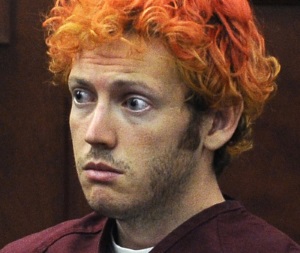
.
I highly recommend everyone read this piece (and his many others) in full.
The politics of fear is buffered by news and popular culture, stressing fear and threat as features of entertainment that, increasingly, are shaping public and private life as mass- mediated experience and has become a standard frame of reference for audiences, claims-makers, and individual actors. Similar to propaganda, messages about fear are repetitious, stereotypical of outside “threats” and especially suspect and “evil others.” These messages also resonate moral panics, with the implication that action must be taken to not only defeat a specific enemy, but to also save civilization. Since so much is at stake, it follows that drastic measures must be taken, that compromises with individual liberty and even perspectives about “rights”, the limits of law, and ethics must be “qualified” and held in abeyance in view of the threat.
In addition to propaganda effects, the constant use of fear pervades crises and normal times: it becomes part of the taken-for-granted word of “how things are,” and one consequence is that it begins to influence how we perceive and talk about everyday life, including mundane as well as significant events. This produces a discourse of fear, the pervasive communication, symbolic awareness, and expectation that danger and risk are a central feature of everyday life. Tracking this discourse shows that fear pervades our popular culture and is influencing how we view events and experience.
News formats, or the way of selecting, organizing and presenting information, shape audience assumptions and preferences for certain kinds of information. The mass media are important in shaping public agendas by influencing what people think about, and how events and issues are packaged and presented. Certain news forms have been developed as packages or “frames” for transforming some experience into reports that will be recognized and accepted by the audience as “news.” Previous research has shown how the “problem frame” was encouraged by communication formats and in turn has promoted the use of “fear” throughout American society (Altheide, 1997).
Fear is presented in the mass media, especially the news media as a feature of entertainment. The use of fear has increased dramatically over the last decade and a half, peaking around 1994. A qualitative content analysis from 1987 – 1996 of several major newspapers shows that the use of fear about doubled in headlines and text of news reports (Altheide and Michalowski, 1999).
The point is, when they blast the news of a single shooting event repeatedly all day long to 300+ million people, this is what we call gross over-reporting. The obvious effect is to create the perception of there being "too many" shootings. Quite frankly, with so many people in this culture of militaristic violence, I'm surprised we don't hear crazy stories all the time involving crazy explosions and so on, just a a mere inherent part of life with so many people running around with all manner of various mental illnesses and such.
I liken this effect to this 'big' thing the past couple years of there being "too many celebrities dying" every year. The problem isn't that too many are dying, the problem is there are too many of them period. By now we all know more about more celebrities than we do actual people we've even met. That should be the big story, likewise on a week when there are no "big" shootings that should be the headline.
These media vultures are the same people who push celebrity culture down our throats as "news" (in between the big "opportunities" they get when another shooting happens).
In practice, this is the "Left's" own "Disaster Capitalism" agenda, which is ironic considering Naomi Klein wrote her book about the concept in regards to the practices of the Neoliberal Capitalists & Neocon Warmongers:
Disaster Capitalism: (censorious) the practice (by a government, regime, etc) of taking advantage of a major disaster to adopt liberal economic policies that the population would be less likely to accept under normal circumstances
www.dictionary.com...
Both premises of her work above ("Disaster Capitalism" & "The Shock Doctrine") are entirely on point with all of this. In fact, there could hardly be a better motif than the SHOCK doctrine...

In what The Wrap characterizes as “a grim coincidence,” it turns out that the trailer that played in theaters before The Dark Knight Rises was for the upcoming movie Gangster Squad and included a scene with trench-coated gangsters firing machine guns through a movie screen into a theater audience.www.mediaite.com...
.
edit on 28-6-2016 by IgnoranceIsntBlisss because: (no reason given)
a reply to: IgnoranceIsntBlisss
OP isn't bad, but you're preaching to the choir.
You should go post this on CNN's or MSNBC's blogs, it would reach more people.
OP isn't bad, but you're preaching to the choir.
You should go post this on CNN's or MSNBC's blogs, it would reach more people.
No one is really getting shot in the UK. It's exceptional if it happens. That's point.
Jesus...its like trying to teach infants logic.
Jesus...its like trying to teach infants logic.
a reply to: BestinShow
I seriously dont even have time to let alone be 'screwing around' on here, but feel free to repost any of my stuff anywhere any time.
Although I do see on here (forever now) this endless posting of "BREAKING" news, almost like there's some race to be first to get the big shooting thread going. So today I couldn't resist crash coursing this piece (in a mere 2 hours) I should have wrote at length about 8 years ago.
I seriously dont even have time to let alone be 'screwing around' on here, but feel free to repost any of my stuff anywhere any time.
Although I do see on here (forever now) this endless posting of "BREAKING" news, almost like there's some race to be first to get the big shooting thread going. So today I couldn't resist crash coursing this piece (in a mere 2 hours) I should have wrote at length about 8 years ago.
edit on
28-6-2016 by IgnoranceIsntBlisss because: (no reason given)
a reply to: IgnoranceIsntBlisss
It almost seems like you are saying the media is manipulating people and the sheeple are falling for it hook, line and sinker. Actually, that is exactly what is happening.
It almost seems like you are saying the media is manipulating people and the sheeple are falling for it hook, line and sinker. Actually, that is exactly what is happening.
originally posted by: 3danimator2014
No one is really getting shot in the UK. It's exceptional if it happens. That's point.
Jesus...its like trying to teach infants logic.
Why do you people keep using this retarded logic? There is 64Million in the UK verses 320million in the USA. Why do you people think it is a linear statistic? Per capita is not realistic. The more people the higher the rate of problems. If the UK had 320 million people the gun related deaths would not be linear from 64mill to 320mill.
Also most of our gun deaths are in areas were guns are already highly regulated if not banned. If you remove Chicago and a few other gang infested cites the gun crime is much closer to UKs even with guns not being banned or severely regulated.
Remove all NON MASS SHOOTINGS from the statistics and gun deaths would actually be less than the UK's. But let's concentrate on MASS SHOOTINGS because it is a great buzz phrase.
Why are people not concerned about semi-auto pistols that cause the majority of gun deaths but instead concentrate on the AR-15 which is used for a tiny fraction of overall gun deaths?
And futher more why is the actual SHOOTER not the concentration of the problem? What happened to being responsible for your own actions?
edit on 28-6-2016 by Orionx2 because: spelling
edit on 28-6-2016 by Orionx2 because: spelling
originally posted by: Metallicus
a reply to: IgnoranceIsntBlisss
It almost seems like you are saying the media is manipulating people and the sheeple are falling for it hook, line and sinker. Actually, that is exactly what is happening.
Gotta keep them ratings up! How better than to use an easily manipulated self-feeding system?
Cheers - Dave
a reply to: bobs_uruncle
It's not like people are going to turn off their TV sets and go...outside.
People are going to watch whatever dribble is on the hypno-box. It doesn't matter what it is. America's Got Talent, The Bachellor or whatever.
People are addicted to 24/7 news. They can make an earthworm crawling across a plate seem interesting for days.
I think the news people are just incredibly bored and go nuts when a big story hits and go overboard.
I think we give people to much credit and assume all these carefully laid plans are working behind the scenes, as some Disney villain cackles maniacally.
What do have is a bunch of rich people trying to stay rich and get richer, and screw over anyone that tries to stop them. If anything it's warfare among the elites that we are witnessing. We're just pawns as they plot war against themselves. They aren't trying to use is for anything more than a weapon against their economic rivals.
/rant
It's not like people are going to turn off their TV sets and go...outside.
People are going to watch whatever dribble is on the hypno-box. It doesn't matter what it is. America's Got Talent, The Bachellor or whatever.
People are addicted to 24/7 news. They can make an earthworm crawling across a plate seem interesting for days.
I think the news people are just incredibly bored and go nuts when a big story hits and go overboard.
I think we give people to much credit and assume all these carefully laid plans are working behind the scenes, as some Disney villain cackles maniacally.
What do have is a bunch of rich people trying to stay rich and get richer, and screw over anyone that tries to stop them. If anything it's warfare among the elites that we are witnessing. We're just pawns as they plot war against themselves. They aren't trying to use is for anything more than a weapon against their economic rivals.
/rant
a reply to: IgnoranceIsntBlisss
Excellent OP good sir!!
When trying to understand the mechanisms of the mainstream media and their well orchestrated programming of the masses one simply needs to look back the book Propaganda by Edward Bernays.
In doing so one will clearly understand the elites game of controlling the masses through their basic animal instincts. From sex to violence they continue to control the consciousness of the masses. Keeping everyone in their fight or flight mindset through what amounts to trauma based mind control.
S&F for you!!
Excellent OP good sir!!
When trying to understand the mechanisms of the mainstream media and their well orchestrated programming of the masses one simply needs to look back the book Propaganda by Edward Bernays.
In doing so one will clearly understand the elites game of controlling the masses through their basic animal instincts. From sex to violence they continue to control the consciousness of the masses. Keeping everyone in their fight or flight mindset through what amounts to trauma based mind control.
S&F for you!!
While standing in line to pay at a large shopping center, I get slapped with this wonderful piece of fear mongering trash.
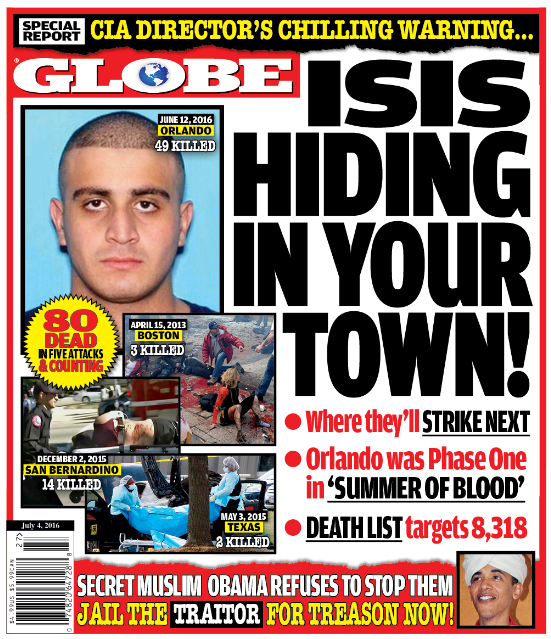
Headlines like that stop a sheep's brain just long enough for them to question the possibility, leaving any details to the imagination. People are conditioned to use assumption based logic so they can be controlled by the power of suggestion. It's what our politicians hope to achieve by displaying this garbage.
The media is a weapon.

Headlines like that stop a sheep's brain just long enough for them to question the possibility, leaving any details to the imagination. People are conditioned to use assumption based logic so they can be controlled by the power of suggestion. It's what our politicians hope to achieve by displaying this garbage.
The media is a weapon.
edit on 28-6-2016 by eisegesis because: (no reason given)
originally posted by: MystikMushroom
I think the news people are just incredibly bored and go nuts when a big story hits and go overboard.
I think we give people to much credit and assume all these carefully laid plans are working behind the scenes, as some Disney villain cackles maniacally.
Your point makes sense, but The Politics of Fear is actual across the board policy. It 'always' has been since the Cold War era (at least).
MUST SEE COLD WAR ERA DOOM-MONGERING: CLEAN UP YOUR HOUSE OR BE NUKED TO DEATH!!!!
After the Cold War "they" needed new material to focus on so then they started really going overboard with stuff like Saddam Hussein ("Hitler Revisted" -GHWB), terrorism, violence, shootings and as Michael Crichton underscored (in State of Fear)... Global Warming.
The thing about the over-reporting of the shootings is, where Global Warmongering might get people to live more ecofriendly, the the sensational violence only begets yet more sensational violence. The lowest of the low.
edit on 28-6-2016 by IgnoranceIsntBlisss because: (no reason
given)
a reply to: IgnoranceIsntBlisss
this thread needs a theme song,
i usually don't care much for cover bands, and remakes but this one is pretty good.
this thread needs a theme song,
i usually don't care much for cover bands, and remakes but this one is pretty good.
a reply to: IgnoranceIsntBlisss
The "monkey see monkey do" picture reminded me of this video.
Please remember this video next time a multiple victim public shooting occurs.
a reply to: eisegesis
That is scary.
Not talking about the headlines. I'm referring to the "media" in our country.
While I realize its a gossip rag, this still has an effect on people, especially those reading these magazines.
Theyre not stable to begin with.
The "monkey see monkey do" picture reminded me of this video.
Please remember this video next time a multiple victim public shooting occurs.
a reply to: eisegesis
That is scary.
Not talking about the headlines. I'm referring to the "media" in our country.
While I realize its a gossip rag, this still has an effect on people, especially those reading these magazines.
Theyre not stable to begin with.
edit on 28-6-2016 by gladtobehere because: wording
a reply to: MystikMushroom
Nawwwww, follow the money. It's in the advertising they get from ratings boosts.
Of course, maybe you're right and all the uber rich are incredibly lucky. Statistically improbably lucky that ever nutbar tool just happens to dream up doing the wrong thing at the right time to further the agendas of the uber rich.
Cheers - Dave
Nawwwww, follow the money. It's in the advertising they get from ratings boosts.
Of course, maybe you're right and all the uber rich are incredibly lucky. Statistically improbably lucky that ever nutbar tool just happens to dream up doing the wrong thing at the right time to further the agendas of the uber rich.
Cheers - Dave
But on the flip side i quite often see posts on ATS that start of with something like "active shooter in my home town and media not reporting!". Just
seems like people will scream conspiracy if the media does report and if it doesnt.
If the media doesnt spend all day going though all the details of what happened people complain that they are doing it to cover things up. They are spreading fear if they do report and they are hiding something if they dont.
If the media doesnt spend all day going though all the details of what happened people complain that they are doing it to cover things up. They are spreading fear if they do report and they are hiding something if they dont.
a reply to: hounddoghowlie
That was pretty good. THere needs to be a remake like that for:
"AND THESE ARE THE LIES WE'RE GIVEN
OH OH OH"!
That was pretty good. THere needs to be a remake like that for:
"AND THESE ARE THE LIES WE'RE GIVEN
OH OH OH"!
a reply to: PhoenixOD
Check out that full the "Notes Towards a Politics of Fear" paper I cited heavily. In it they detail a huge ongoing quantitative analysis they did forever, as the basis of all that commentary I pasted into the OP. He has tons of other similar papers over the past few decades, covering violence, terrorism, etc.
Check out that full the "Notes Towards a Politics of Fear" paper I cited heavily. In it they detail a huge ongoing quantitative analysis they did forever, as the basis of all that commentary I pasted into the OP. He has tons of other similar papers over the past few decades, covering violence, terrorism, etc.
new topics
-
A Merry Christmas.
Other Current Events: 1 hours ago -
Cold Blooded Killers on Christmas!! GRRRRrrr!!
Pets: 9 hours ago
top topics
-
Orange County Makes Shoplifting a Felony
Other Current Events: 17 hours ago, 17 flags -
Cold Blooded Killers on Christmas!! GRRRRrrr!!
Pets: 9 hours ago, 9 flags -
Plane Crash Today --Azerbaijanian E190 passenger jet
Mainstream News: 13 hours ago, 6 flags -
A Merry Christmas.
Other Current Events: 1 hours ago, 1 flags
active topics
-
It's Offical Now
US Political Madness • 17 • : Freeborn -
‘Something horrible’: Somerset pit reveals bronze age cannibalism
Ancient & Lost Civilizations • 23 • : BrucellaOrchitis -
A Merry Christmas.
Other Current Events • 3 • : Cloudbuster1 -
Plane Crash Today --Azerbaijanian E190 passenger jet
Mainstream News • 17 • : Naftalin -
London Christmas Market BANS Word ‘Christmas’
Social Issues and Civil Unrest • 51 • : Naftalin -
-@TH3WH17ERABB17- -Q- ---TIME TO SHOW THE WORLD--- -Part- --44--
Dissecting Disinformation • 3814 • : brewtiger123 -
Cold Blooded Killers on Christmas!! GRRRRrrr!!
Pets • 10 • : Flyingclaydisk -
The clotting is not going away latest
Medical Issues & Conspiracies • 15 • : NoCorruptionAllowed -
Statements of Intent from Incoming Trump Administration Members - 2025 to 2029.
2024 Elections • 54 • : WeMustCare -
DefCon Teetering on Escalation
World War Three • 51 • : WeMustCare
